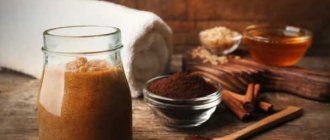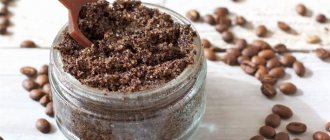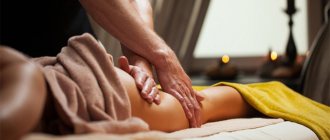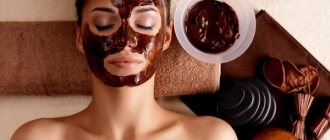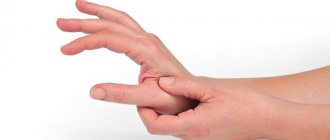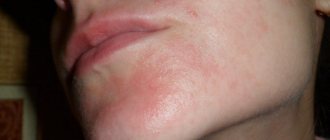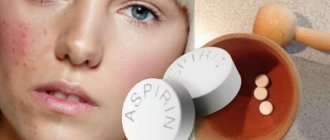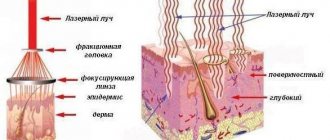Many people start their morning with a big cup of coffee. About 90% of the world's population consumes caffeine daily, and more than half consume more than 300 mg per day.
Caffeine is a stimulant and helps us wake up. But there are supporters of the theory that caffeine stimulates our skin. They say coffee peeling reduces cellulite and strengthens the skin. However, these results are usually temporary.
The desire to stay young causes many to do irrational things, often without spending time on research. If you were to look for scientific studies that support the use of caffeine as an anti-aging agent, you will find very little.
In this article, we'll look at the topic of caffeine and its effects on your skin.
Is there a connection between coffee and acne?
Coffee has been linked to a number of health problems, including those that affect the skin.
As a result, people who have acne may worry that drinking coffee may make their condition even worse. Some may believe that giving up coffee clears up their skin. However, there is no evidence yet that coffee itself causes acne.
Coffee is a source of antioxidants that may be beneficial for the skin. But for some people, drinking coffee can make acne or oily skin worse, as can adding sugar or milk to it.
However, most people who have acne problems can drink coffee in moderation, simply by avoiding or limiting additives such as milk and sugar.
But how does it affect the skin?
Caffeinated drinks are known for their antioxidant content. Antioxidants such as phenols help fight free radicals that can harm the skin. They dilate blood vessels under the skin to improve metabolism and the appearance of the skin. This is where the skin benefits of drinking caffeinated drinks end.
Drinking large amounts of coffee isn't always beneficial, but there are some skin care products that contain caffeine that can benefit your skin. Keep reading to find out more.
Benefits of coffee for skin
Antioxidants are substances that prevent or slow down the damage or oxidation of cells in the body. Many plant foods, especially fruits and vegetables, contain antioxidants. Coffee is also a good source of antioxidants.
Some evidence suggests that antioxidants may be beneficial for the skin and may improve skin conditions.
One small study found that antioxidants helped improve skin conditions while using acne medications such as benzoyl peroxide and salicylic acid.
View Detox Supplements
Summary
Coffee contains beneficial antioxidants that can be beneficial for your skin and overall health. However, drinking too much caffeinated coffee and adding sugar or milk can make acne worse.
Acne-prone people should try cutting back on caffeine, dairy (especially low-fat dairy), and sugar to see if it helps improve their skin.
If your acne continues to get worse or doesn't improve, don't waste any time scheduling a consultation with a dermatologist.
Girls, this world is not so bad as long as there is coffee in it :) Take care of yourself. Write in the comments what else you would be interested in reading about. See you in new articles!
How can I thank you?
If you liked the article and our website was useful to you, you can also help us by posting a link on social networks.
Coffee and hormones
Caffeine can affect hormone levels in the body, and here's what may concern regular coffee drinkers:
Cortisol
Research has shown that caffeine can increase levels of the so-called stress hormone, cortisol. Too much cortisol can have harmful effects on the body.
A study of 144 young women found that higher levels of stress led to more acne.
Cortisol can also cause the skin to produce more sebum or oil, which can lead to acne.
Chronically high cortisol levels can affect other health problems that may be associated with acne, including:
- weight gain
- depression
- digestive problems
- anxiety
Additionally, caffeine can interfere with sleep, which also affects cortisol levels.
Lack of quality sleep can cause the body to produce more cortisol, which can contribute to inflammation. This inflammation can affect the skin, causing more acne.
To avoid some of the possible negative effects of coffee, people may need to avoid caffeine several hours before bed.
Insulin
Caffeine can also cause insulin levels to rise, and research shows that this can worsen skin conditions.
One study found that people who had higher insulin levels were more likely to have severe facial acne.
Estrogen
Caffeine may alter estrogen levels in women of childbearing age, but this varies from person to person.
An old study of 250 women found that consuming 200 mg of caffeine per day increased estrogen levels in Asian participants but decreased them in white people.
Read reviews about detox supplements
Useful and harmful properties
The caffeine contained in the beans helps improve blood circulation and dilate blood vessels. Similar changes are observed when taken orally, as well as in the case of topical use. The benefits of coffee for the skin are undeniable. Therefore, it is included in various cosmetics.
When systematically applying coffee ointments and masks, the following effects on the skin are noted:
- maintaining water balance. The dermis takes on a healthy appearance;
- normalization of the activity of the sebaceous glands;
- elimination of inflammation;
- lightening blackheads;
- reduction of puffiness, disappearance of bags and bruises under the eyes;
- getting rid of cellulite;
- the epithelium becomes elastic and taut. Small wrinkles disappear.
Coffee consumed in large quantities spoils the appearance of the skin. In addition, cosmetics can cause harm, but only if they are used in the presence of active inflammation, open wounds and a tendency to rosacea.
Coffee, milk and acne
Many people add milk or cream to their coffee. There is some evidence to suggest that drinking large amounts of milk may cause acne or worsen existing skin conditions.
- One study found that teenagers who consumed more skim milk had significantly more acne than those who consumed whole milk or no milk at all.
- Another study of 57 people with acne found that those who consumed more milk had more acne.
- A study on the link between diet and acne suggests that drinking milk increases levels of insulin-like growth factor (IGF-1). Further research claims that high levels of IGF-1 lead to acne.
How does caffeine affect the skin?
Caffeine is a stimulant. Natural is found mainly in coffee and tea. It strengthens the central nervous system and stimulates brain function, helping you stay awake.
Caffeine is an addictive substance. It is quickly absorbed into the blood. Side effects from consuming caffeine include: dehydration, increased urination, nausea, increased blood pressure, increased heart rate, anxiety, and more. Excessive caffeine consumption can lead to hair loss.
Coffee, sugar and acne
People who have acne can also try limiting or avoiding sugar in their morning cup of coffee.
Research has shown a link between acne and foods with a high glycemic index, or those that cause spikes in blood sugar. These foods often contain large amounts of sugar, especially added sugar.
One study found that people who consumed more glycemic foods had a greater risk of acne. Additionally, a systematic review found that a low-sugar diet may help improve overall skin health.
Benefits of coffee in cosmetics
Everyone has probably heard about the wonders of caffeine in eye cream or body scrubs. But how effective are these products? Caffeine in topical products has anti-inflammatory and antioxidant properties.
The caffeine in wraps can also temporarily reduce the appearance of cellulite by dehydrating the tissue. But, again, these are most likely “short-term effects.” If you like coffee-based skincare products, continue to use them. But don't expect any miracles or long-term results.
Drinking coffee without worsening acne
There are several ways to enjoy your coffee without it negatively affecting your acne. Such methods are given below:
- Consuming less caffeine overall: People can do this by buying decaf coffee or drinking coffee much less frequently. However, they should be aware of other drinks such as tea and energy drinks that may also contain caffeine. The Food and Drug Administration (FDA) recommends no more than 400 mg of caffeine per day, or 4 to 5 cups of regular coffee. However, some people are more sensitive to the effects of caffeine and should consume much less than this amount.
- Reducing sugar: This can be achieved by adding less sugar to your coffee, as well as reducing or eliminating sugary sodas from your diet.
- Reducing low-fat or skim milk: You can do this by replacing milk with dairy cream, or using whole milk.
Care and cosmetics
Maintenance must be regular. Every day, the skin is subjected to serious tests - the pores become clogged, and as a result, the cells cannot receive enough oxygen and nutrients. Care is not just washing twice a day with plain water, but a whole step-by-step procedure:
- make-up remover using soft foam without aggressive substances, based on micellar water;
- treatment with tonic;
- applying serum;
- using a product for the eye area (for swelling, circles, possibly with a lifting effect);
- applying a moisturizing and nourishing cream (different for night and day).
Approximately 2 – 3 times a week you need to use a scrub. You can buy ready-made products or make the composition yourself. Drinking brewed coffee, ground almond kernels, and sea salt are suitable for this. you can add honey, essential oils, vitamins, fruit or vegetable purees, bran, and so on.
You should also pamper your skin twice a week with a mask containing nutrients, collagen and hyaluronic acid. For age-related and problematic dermis, salon procedures are more suitable:
- mesotherapy;
- chemical peeling;
- microcurrents;
- laser and phototherapy.
It is very important to use both decorative and skincare cosmetics in exact accordance with your skin type. Before use, you need to conduct an allergy test - apply the product to the elbow or wrist for 5 minutes. Under no circumstances should you use expired or low-quality cosmetics, as this can lead to a deterioration in the condition of the epidermis and allergic reactions.
There are many factors that spoil the skin. But negative consequences can be avoided if you adhere to all the rules of care and lead a healthy, fulfilling lifestyle.
Causes and treatment of acne
Acne develops when the skin produces too much oil. This excess oil causes skin cells to become stuck inside the pore. Bacteria from the skin combine with oily and dead skin cells to form a red, inflamed bump.
The causes of acne are different for each person. Research shows that acne can be passed on genetically. But they can appear at any age, regardless of whether people have a family history of acne or not.
If a person has acne, they may first try over-the-counter products that contain salicylic acid or benzoyl peroxide.
If the skin does not improve within a few weeks or worsens, you should consult a dermatologist. Failure to treat acne can lead to scars on the face and body and emotional distress.
What if used externally?
Cosmetologists advise representatives of the fair half of humanity to pay attention to the use of coffee as a cosmetic product. External use will not harm the skin; on the contrary, it will have a beneficial effect on its appearance. It’s not for nothing that caffeine is included in many cosmetic products: serums, scrubs, masks.
Coffee in patches and serums for the area around the eyes relieves puffiness, reduces swelling, and improves skin color.
Coffee scrub
Coffee grounds are recommended to be used as scrubs to reduce the appearance of cellulite. Unlike sea salt or sugar, the grounds act much more gently, without damaging the skin. The coffee scrub gently and delicately exfoliates dead cells, and the flavonoids contained in caffeine prevent premature aging.
Scrubs with coffee promote weight loss and improve skin condition. They are easy to prepare at home. A scrub is prepared from fresh grounds. It must be thoroughly dried and poured into a glass jar. It is important that the mass is made from natural coffee, without adding sugar, milk, cream and other additional ingredients.
The scrub is used in portions, as needed. The product is applied to damp skin of the face and body, as well as the décolleté, and this should be done carefully, lightly pressing onto the skin. If the scrub is used for the body, you can add natural honey to the product as a binding component. Apply the product to problem areas using patting movements. Press your palm lightly against your body, then tear it away. Coffee and honey scrub stimulates blood circulation, improves skin condition, gives elasticity and evens out.
Scrub with honey and olive oil
Required ingredients:
- 2 tbsp. l. coffee grounds;
- 1 tbsp. l. olive oil;
- 1 tbsp. l. natural honey.
The product is suitable for normal and oily skin.
Scrub for normal and sensitive skin
- 1 tbsp. l. honey;
- 2 tbsp. l. coffee grounds;
- 1 tbsp. l. olive oil;
- 1 tbsp. l. sour cream.
Scrub mask based on natural coffee for the body
At home, you can easily and quickly prepare a body scrub mask from coffee and honey. The cosmetic product perfectly cleanses the skin and also has a lifting effect.
Prepare a mask from natural coffee as follows:
- 2 tbsp. l. pour boiling water over natural coffee, let it brew, and then filter.
- Add a tablespoon of honey to the coffee grounds and mix thoroughly.
- If the mask is intended for dry skin, add a tablespoon of olive oil or grape seed.
Apply the scrub mask to clean, damp body skin in a circular motion. Massage problem areas for 3-5 minutes, and then leave the product for 10 minutes. After this, the scrub must be rinsed off with warm water.
The scrub mask can also be used for the face. Apply the product in light circular movements, massage lightly and leave for a couple of minutes.
Coffee face mask
Homemade coffee masks are very popular. Their production does not take much time, and the effect occurs after just a few sessions. Coffee masks increase skin tone, improve complexion, eliminate dryness and promote rejuvenation. An important rule is to use only natural coffee without additives.
Coffee mask for problem skin
Mix a spoonful of blue or white clay with the same amount of coffee grounds. You can add a teaspoon of finely chopped orange zest. Add a little boiled water to get the consistency of thick sour cream. Take a pinch of baking soda, quench it with apple cider vinegar and add to the mixture. Apply the mask to cleansed facial skin, hold for 5-7 minutes, then rinse with warm water.
Refreshing coffee mask
Grind the kernels of several walnuts into a fine powder. Mix with coffee grounds and apply to cleansed, damp facial skin using circular movements. Leave on for 8-10 minutes and then rinse off. The product has an excellent effect on the skin, instantly improves complexion, and hides signs of fatigue. You can make such a mask before an important meeting or special event to conquer with your amazing appearance.
Coffee cubes
Brew strong coffee, cool and pour into ice cube trays. Freeze and use every morning to wipe your face and neck. Coffee ice cubes will help restore skin tone, smooth out facial wrinkles, and improve complexion.
Cleansing mask
Combine coffee grounds and olive or any other unrefined vegetable oil in equal proportions. Add a pinch of ground cinnamon and salt to the mask. Apply to cleansed facial skin with light circular movements, leave for 7-10 minutes, and then rinse with warm water. The mask cleanses skin pores and prevents the appearance of acne.
Etiology and pathogenesis
Coffee stains on the skin usually indicate that the patient has neurofibromatosis type I , a multisystem disease characterized by spots on the back, neck, and axillary areas, as well as skeletal dysplasia, benign or malignant tumors of the nerve sheaths (neurofibromas). The average incidence of neurofibromatosis type I is 1:3000. Its main causes are considered to be mutations or deletions (loss of a section) of the NF1 gene. This gene is responsible for the production of neurofibromin 1, a protein that suppresses the occurrence of tumors of the nervous system. A decrease in its synthesis leads to the appearance of neurofibromas and other clinical signs of the disease.
Coffee stains on the skin can also occur for the following reasons:
- Albright-McCune-Sternberg syndrome - premature puberty, multiple fibrous osteodysplasia, skin hyperpigmentation.
- Bourneville-Pringle disease - tuberculous sclerosis; a rare genetic disease in which multiple benign tumors form in organs and tissues.
- Fanconi anemia is manifested by a complex of symptoms, the most serious of which are hematological disorders and tumors.
- Coffin-Siris syndrome is characterized by aplasia or hypoplasia of the distal phalanx or nail on the fifth toe, developmental delay, mental retardation, coarse facial features, etc.
Cafe-au-lait skin spots may be the result of RAS mutations —changes in the RAS family of genes and proteins. These are small GTPases (enzymes that bind and hydrolyze guanosine triphosphate, an energy substrate for RNA), which are involved in signal transmission from outside the cell and regulate cell division. Some RAS mutations promote the emergence and metastasis of tumors.
In 50% of patients, the genetic mutations responsible for the appearance of coffee spots on the skin occur spontaneously. That is, the hereditary mechanism of transmission of the disease in this case is of indirect significance.
As for pathogenesis , coffee spots appear against the background of an increase in melanin production and the presence of giant melanosomes in the skin. In patients with neurofibromatosis type I, the number of melanocytes in age spots increases more significantly compared to other diseases.
Rules for applying masks
Applying coffee masks is practically no different from the others:
- use only freshly prepared products;
- check the skin’s reaction to the components that make up the mask;
- the skin must be prepared before applying the product;
- You can apply the composition with a brush, or you can use your fingertips. Thin and delicate skin around the eyes should be treated especially carefully;
- Start applying from top to bottom and preferably along massage lines.
The picture shows the directions of the massage lines along which the mask should be applied
After applying the product, it is better to sit in a chair or lie down, first placing a towel under your head.
Important! If you feel discomfort after applying the mask, it is better to wash off the composition immediately.
What benefits do these coffee masks give you?
Don't you love it when you can put together a few simple ingredients and create something beautiful like a face mask? Coffee, cocoa, oils…..this is the peak of relaxation, don’t forget to love your skin.
- Coffee beans reduce inflammation and redness and also reduce the appearance of under-eye circles. The grounds are an excellent exfoliant that removes dead cells. Plus, making your complexion brighter and more vibrant!
- Cocoa powder is loaded with antioxidants that protect against free radicals. Its high sulfur content makes it great for fighting acne too!
- Milk perfectly gives the skin a youthful, smooth and healthy glow. Amino acids help keep skin hydrated.
- Lemon juice contains natural vitamin C , which brightens the skin tone and tightens it by regulating oil production.
- Honey naturally retains moisture.
Treat yourself to homemade skin care products.
Coffee face scrubs
The skin must be cleaned periodically to remove dead, dead cells from its surface. That's why women use store-bought scrubs. But coffee ones are much more effective, they not only cleanse the skin, but also increase its tone.
They are applied to a clean face and begin to massage the skin with gentle circular movements for 2-3 minutes. Then rinse with warm water.
Reviews
Victoria: I often use natural coffee to nourish my hair, but for some reason I didn’t think of using it on my face. Having used one of the recipes for a coffee mask, I was pleasantly surprised by the good effect. Now I will alternately use coffee not only for hair care, but also for my face. Fast, effective and inexpensive!
Vasilisa: I really love folk beauty recipes and often experiment with new compositions. Of course, it’s impossible to completely replace store-bought cosmetics (sometimes you’re just too lazy to prepare something; it’s easier to take a tube of cream or lotion), but I’ve already replaced many “ready-made” products with homemade ones. Having heard advice to use coffee grounds, I searched for a long time for a suitable companion for my dry skin, until I tried mixing it simply with honey. The effect is amazing, now I actively recommend this product to all my friends. Those who are not lazy also use it, although in my opinion the recipe is simpler.
Olga: Coffee has also proven itself in cosmetology; I wipe my face with the remnants of the drink every morning, and in the summer I use frozen ice cubes. The result is impressive: the skin is clean and radiant, there are no fine wrinkles or facial folds. The best remedy, especially in terms of savings.
Coffee has also proven itself excellent in cosmetology; I wipe my face with the remnants of the drink every morning, and in the summer I use frozen ice cubes. The result is impressive: the skin is clean and radiant, there are no fine wrinkles or facial folds. The best remedy, especially in terms of savings. You can read about the beneficial properties of bey oil and its use for hair here.
